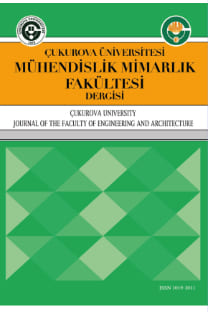On the Thermo Economical Optimization for Solar Hot Water Heating Systems
Güneş Sıcak Su Isıtma Sistemleri için Termo Ekonomik Optimizasyon Üzerine Bir Çalışma
___
1. Nshimyumuremyi, E., Junqi, W., 2019. Thermal Efficiency and Cost Analysis of Solar Water Heater Made in Rwanda, Energy Exploration & Exploitation 2019, 37(3), 1147–1161.2. Fraisse, G., Bai, Y., Le Pierrès, N., Letz, T., 2018. Comparative Study of Various Optimization Criteria for SDHWS and a Suggestion for a New Global Evaluation, HAL Id: hal-00452757 https://hal.archives- ouvertes.fr/hal-00452757 Submitted on 20 Nov 2018.
3. Sornek, K., 2016. The Comparison of Solar Water Heating System Operation Parameters Calculated Using Traditional Method and Dynamic Simulations, E3S Web of Conferences 10, 1000137.
4. Serban, A., B˘arbu¸ N., t˘a-Mi¸ su, Ciucescu, N., Paraschiv, S., 2016. Economic and Environmental Analysis of Investing in Solar Water Heating Systems, Sustainability, 2016.
5. Jin Ko, M., 2015. Analysis and Optimization Design of a Solar Water Heating System Based on Life Cycle Cost Using a Genetic Algorithm, Energies, 8, 11380-11403.
6. Dziugaite, R., Streckiene, G., 2014. Solar Hot Water Heating System Analysis Using Different Software in Single Family House. 10.3846/enviro.2014.258.
7. Andrew Ogie, N., Oghogho, I., Jesumirewhe, J., 2013. Design and Construction of a Solar Water Heater Based on the Thermosyphon Principle Ashdin Publishing Journal of Fundamentals of Renewable Energy and Applications, 3, Article ID 235592, 8.
8. Solar Water Heating Andy Walker PhD, 2012. PE Principal Engineer National Renewable Energy Laboratory 7th Annual North American Passive House Conference September 27-30, 2012 Denver CO.
9. I. Abu-Mulaweh, H., 2012. Design and Development of Solar Water Heating System Experimental Apparatus, Global Journal of Engineering Education, 14(1), 99-105.
10. Loomans, M., Visser, H., 2002, Application of the Genetic Algorithm for Optimization of Large Solar Hot Water Systems, Solar Energy, 72, 427-439.
11. Shariah, A.M., Shalabi, B., 1997. Optimal Design for Thermosyphon Solar Water Heater, Renewable Energy, 11, 351-361.
12. Michaelides, I.M., Wilson, D.R., 1996. Optimum Design Criteria for Solar Hot Water Systems, Renewable Energy, 9, 649-652.
13. Farkas, I., Matrawy, K.K., 1996. An Estimation for the Solar Storage Size Based on the Annual Solar Fraction, Renewable Energy, 7, 613-616.
14. Shariah, A.M., Löf, G.O.G., 1996. The Optimization of Tank-volume-to-collector Area Ratio for a Thermosyphon Solar Water Heater, Renewable Energy, 7, 289-300.
15. Forsström, J.P., Lund, P.D., 1985. Optimization of Operating Strategies in a Community Solar Heating System, Applied Mathematical Modeling, 9, 117-124.
16. Söylemez, M.S., 1988. Computer Simulation and Economic Feasibility Analysis of Active Solar Assisted Heating Systems. Master Thesis, M.E.T.U., Ankara.
17. Jaluria, Y., 1998. Design and Optimization of Thermal Systems, Mc Graw Hill, Singapore; 432.
18. Duffie, J.A., Beckman, W.A., 1980. Solar Process Economics. In Solar Engineering of Thermal Processes, Wiley: New York; 376-407.
19. Burmeister, L.C., 1998. Equipment Cost Estimation. In Elements of Thermal-Fluid System Design, Prentice Hall: New Jersey; 263-270.
- ISSN: 1019-1011
- Yayın Aralığı: 4
- Başlangıç: 1986
- Yayıncı: ÇUKUROVA ÜNİVERSİTESİ MÜHENDİSLİK FAKÜLTESİ
Ahmet Muşteba ÖZTÜRK, Fırat SARIBAL, Şeyma DUMAN, Meral AKKOYUN, İbrahim ŞEN, Didem OVALI
Analitik Hiyerarşi Süreci ve Veri Önişleme Yoluyla Türkiye’nin Güç Sistemi Portföyünün Planlanması
Ülkemiz Madencilik Sektöründe Görülen Meslek Hastalıklarının İncelenmesi
Şeyma DUMAN, Büşra BULUT, Burak ÖZKAL
Hasan Hüseyin ÜNAL, Salih Hakan YETGİN
Analysis of Splicing Method on Bursting Strength of the Knitted Fabrics
Bülent SARI, Şeyda Y. GEYİK, Olcayto KESKİNKAN
Gökhan BAŞAR, Yusuf Ziya FEDAİ, Hediye KIRLI AKIN
24 Ocak 2020 Sivrice (Elazığ) Depreminin Şartlı Olasılığının Değerlendirilmesi
